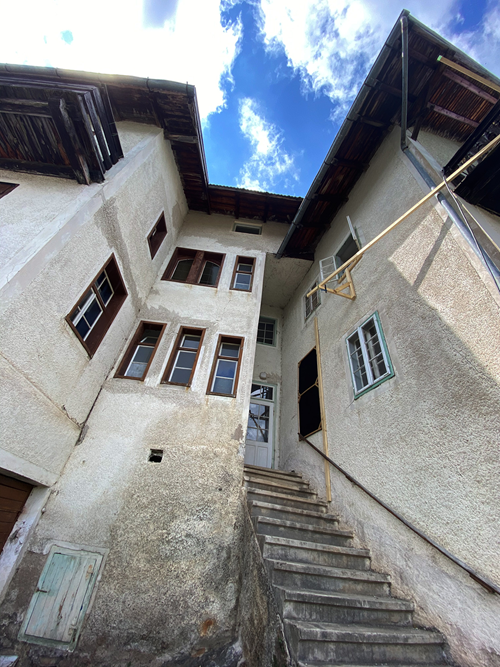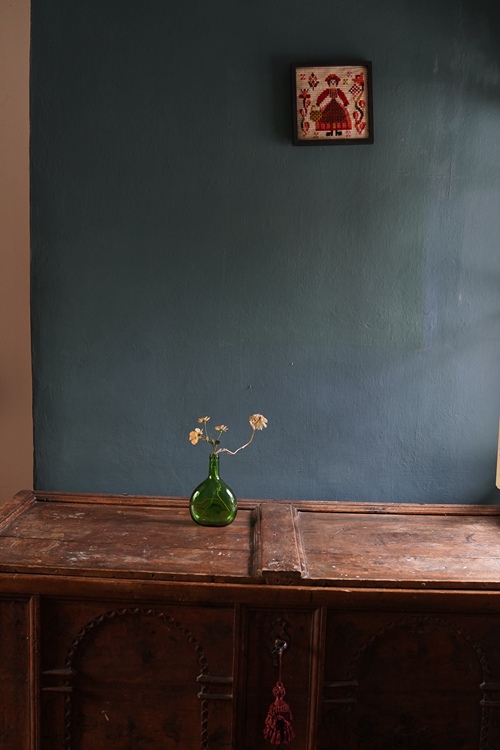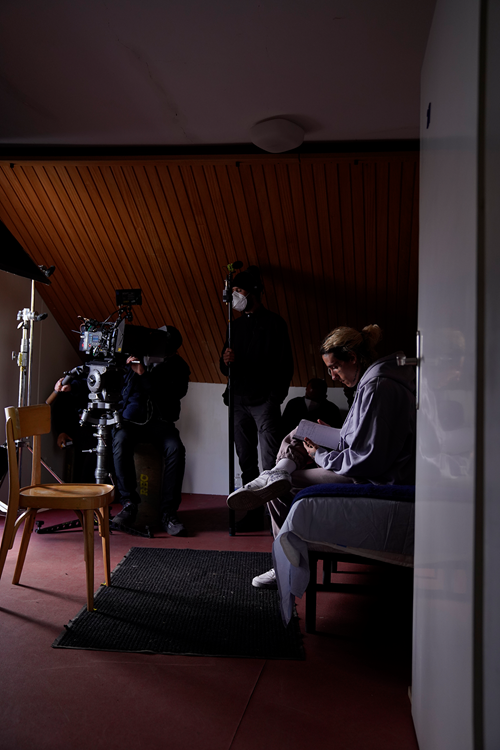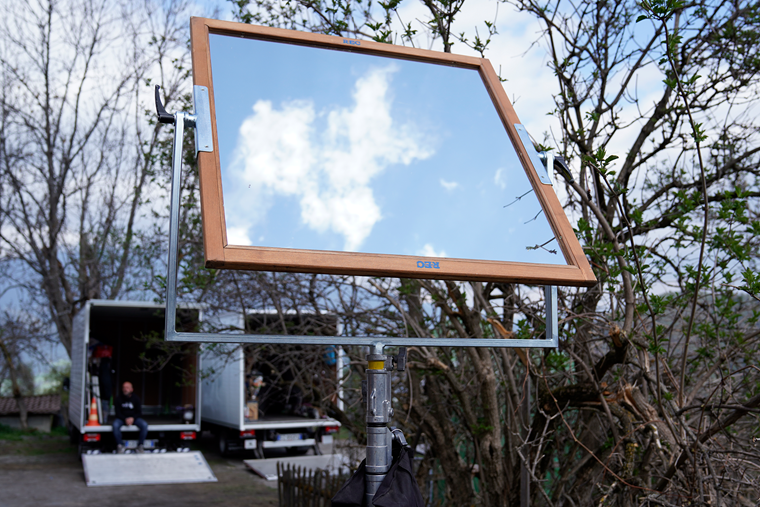Suddenly, silence. The hubbub of the city disappears, and all sound seems to sink into the valley. After just a few steps, the only thing you hear is the sound of tree branches swaying in the wind. Little else. Nothing, in fact. Everything seems a bit unreal in Gufidaun, above the small town of Klausen, a little more than thirty kilometers from Bolzano. But it is in fact an entirely other world, where the frenzy of the digital age no longer exists. Or never arrived, to be precise. The last outpost of civilization as we know it is the Hotel Gnollhof. There’s a parking lot, some people: an isolated spot that’s been tamed. Beyond that, it’s just trees and silence: wilderness. We leave the world behind, one meter at a time. And the forest takes center stage as we are swallowed up.
After some minutes of walking, we arrive at an abandoned house. Here, the small group of people we came to meet is busy at work: it’s the crew of Lovely Boy, the new film directed by Francesco Lettieri, produced by Indigo Film in collaboration with Vision Distribution and Sky, with the support of IDM Film Fund & Commission.
“No, the location is not accidental. In fact, the geography is very important to the narrative of my film,” says Lettieri, looking around during a lull in the action. “And to think that I came here to South Tyrol to ski when I was a child, but, apart from the slopes, I knew next to nothing about this region. And yes, I must say it was quite a lovely surprise.” Far removed from everything, from all the hustle and bustle, it’s like witnessing a hole in time, sitting on a wooden bench in front of the old house with an ancient, faded sign: Stammer.
EMPTINESS AND RELIEF
The house called Stammer was a hotel that shut down one day fifteen summers ago, bidding farewell to the last tourist before facing a series of winters that have made it what it now is, amid creaking stairs and a thick cellar smell that doesn’t leave you even after you’re gone.

“Lovely Boy is divided into two parts,” Lettieri continues, “two parts that carry equal weight. We see the protagonist, Nic, in Rome, lost in the chaos of aggressive concerts, clubbing nights and various substances, before ending up here, in a community of recovering drug addicts.” Nic, aka Lovely Boy, is a singer. He’s a star in Rome’s trap music scene, sucked into a spiral of self-destruction after achieving success. Nic is played by Andrea Carpenzano who, with tattoos on his face and restless glances, wanders around the set looking for the right position, an almost alien figure inside the old Stammer Hotel.
An alien as utterly foreign as the crew must appear to the lady from the neighboring farmhouse, who observes everything with a detachment that may seem naïve, but in fact exudes wisdom. “Because this is a place that forces you to examine yourself, to face yourself,” Lettieri reflects.
“In the Roman part of the film we witness Nic’s existential emptiness; but here we see his return to the essentials, to relationships, to human beings. As a filmmaker, I felt the same relief upon coming up here: after shooting a lot of anxiety-provoking scenes in the city, I found myself in this wild place where nothing seems to happen; but which in truth is the only place where things are real.”
In addition to here at the Stammer Hotel, Lovely Boy was also shot at Meran train station and two other locations near Klausen. It represents Indigo’s first foray into South Tyrol. “Yes, we finally managed to shoot here this time,” nods Nicola Giuliano, a producer at Indigo and an Oscar winner for Paolo Sorrentino’s The Great Beauty. “We’ve been trying for many years. We’ve always wanted to shoot here, and I’m happy to be here with a film that means a lot to all of us. As soon as Francesco saw these locations, he immediately fell in love with them and we came up here to shoot. Production needs have always been important to us, but artistic needs carry even more weight. And we immediately hit it off with Francesco: we instantly understood each other. He’s capable of combining a strong realistic representation with a dramaturgical approach that doesn’t eschew a classical storytelling structure.”

THE MUSIC OF ANXIETY AND THE SILENCE OF EVENING
Just as Giuliano finishes his sentence, a sudden gust of wind kicks up. Above our heads, the white clouds stand stark against the blue sky, creating a sort of impressionist painting that seems to change from moment to moment. “I’m a man of the sea, you know,” he smiles, “Neapolitan. But I’ve always been crazy about the mountains. It hit me like a thunderbolt when I first saw Fred Zinneman’s film Five Days One Summer, starring Sean Connery. That was the moment I discovered that mountains are a whole world apart, perhaps truly the only place in which one can profoundly confront oneself, with no alibis.”
Lunchtime leads the small group of people outdoors, scattered haphazardly among wooden benches and randomly created seating. In the era of sharing at any cost, lost in a social media frenzy to post everything as soon as it happens, this improvised, shared meal smacks of a distant, almost childlike happiness, when little was needed except the company of others. “And to think that Lovely Boy was set elsewhere originally,” says Indigo’s Carlotta Calori, “but after the scouting, Francesco was so pleased with the locations and fascinated by the atmosphere that he decided to set part of the film right here in Klausen.”
Not far from the set, amidst the crew moving from one corner to another and resuming work, we meet Elisa Nicoli, the second A. D., who is quite familiar with these places, having been born and raised in Bolzano, then moving on to Padua and Rome before returning home. “I love film. Always have,” she says.
“I have a degree in editing. Some years ago, knowing that finally some films would shoot here in South Tyrol, I came back because I wanted to get into it. My first experience was a few years ago on the set of Giacomo Battiato’s Max and Hélène. I was in the photography department, but my main interest was in directing. So, after having managed extras for a while on the various sets that have shot in our region, my very first A. D. job arrived, thanks to Lovely Boy – an experience that is proving to be really intense. Carpenzano? A wonderful actor, and also very nice. He never gets stressed on set, even in the most difficult moments.”
Before Lettieri resumes shooting, we meet up again with him to clarify one last aspect of the film, which is not exactly a minor one: the music. “Carpenzano plays a trap musician. By necessity, we therefore had to build a repertoire and aesthetic around him that would make him credible. Andrea knows the Roman music scene well, and he’s even friendly with some of the trap artists. So he studied up on everything before we started filming, starting with the Dark Polo Gang.” The Roman group is one of the most popular in the controversial trap genre, a sub-genre of rap with Italian-language lyrics which originated from American hip hop.

Major artists such as Sfera Ebbasta and Ghali have been highly popular among a very young Italian audience for a few years now. “But be warned: I’m not making a movie about trap,” Lettieri continues. “Rather, Lovely Boy is about the inner journey of a young man. I worked with influential producer Paco Martinelli on the soundtrack: he wrote some unreleased tracks that break away from Italian trap. We tried to make something that wouldn’t sound old once the film comes out, trying to create a separate genre that mixes emo, pop, rap and trap.”
As soon as he finishes the sentence, Lettieri disappears into the Stammer Hotel once more to complete one of the key scenes of the film, which he reveals to us during the interview, but about which we will of course remain silent. The day is coming to an end. Evening falls slowly upon the last moments of the shoot and, after saying goodbye to everyone, we descend meter by meter, in order to re-enter the chaos of traffic, amidst the noise and the cars, the words and the message notifications, trying to preserve the emotions we felt as long as possible. And in that very moment, with the old faded writing on the wall of the Stammer still in my mind, the words of Peter Handke pop into my mind, without me having called them: “The external silence of evening transforms slowly into the inner warmth of the body.”
